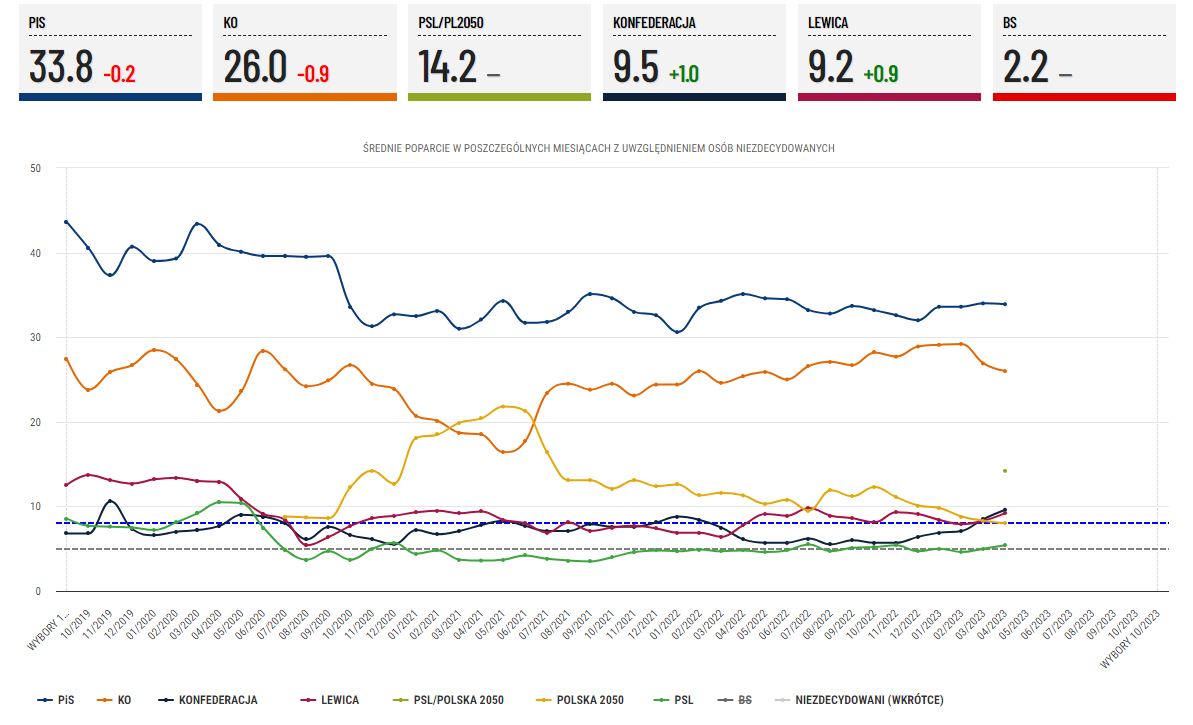A hardline junior party in the ruling coalition party has rebranded itself as “Sovereign Poland” (Suwerenna Polska) and vowed to “defend Polish sovereignty against German collaborators in Polish politics”. Despite its low electoral support, the party holds important positions in the government.
Previously known as “United Poland” (Solidarna Polska) and led by the justice minister and prosecutor general Zbigniew Ziobro, it has often proposed more extreme solutions than the ruling Law and Justice Party (PiS), for example demanding Poland’s withdrawal from the Istanbul Convention on the protection of women against violence and seeking to tighten the blasphemy law.
The widely criticised judicial reforms, which set Poland at loggerheads with the European Union, were also the brainchild of the justice ministry, largely under the control of the party.
Minister @ZiobroPL jako #GośćWydarzeń: Nie chcemy hołdować lewackiej wizji UE, która ma stać się jednym państwem z dominującą siłą narodu germańskiego. Nie chcemy stać się landem. #SuwerennaPolska pic.twitter.com/3fVDP4E3qb
— Suwerenna Polska (@SolidarnaPL) May 3, 2023
“We are creating Sovereign Poland in order to proclaim a clear ‘no’ to those who are aiming to take away our sovereignty and thus our independence,” said Ziobro during the party convention yesterday in Warsaw. “Poland’s sovereignty is today under the greatest threat since the fall of communism”.
Ziobro pointed to two dangerous processes “that we’re dealing with” – one being Russia “waging a bloody war against our neighbour”, the other “left-wing fanatics in Western Europe pushing the project of changing the EU into a federal state under German leadership”. He also spoke of attacks on Christians, Polishness, family values and the late Pope John Paul II.
“Just as the reformers of the First Republic of Poland defended their homeland, defended Poland against the Targowiczanie (supporters of the Targowica Confederation that opposed the first Polish constitution adopted on 3 May 1791, used as a synonym for traitors), so we, today, must defend Polish sovereignty against the German collaborators in Polish politics,” he said.
Ziobro alleged that the European Commission’s president, Ursula von der Leyen, “with her typical German nerve and arrogance, has enthroned in Poland” an opposition leader, a former prime minister of Poland and a former president of the European Council as her “viceroy”.
“This shows that Germany treats [Donald] Tusk as its agent of influence in Warsaw,” he added.

Source: ewybory.eu
According to an average of polls, aggregated by ewybory.eu, the PiS-led bloc, to which Sovereign Poland currently belongs, could count on 33.9% support in April for the elections scheduled for this autumn. Meanwhile, Civic Coalition (KO), led by Tusk, would have 26% support.
Although both parties have been losing slightly over the past month, while the far-right Confederation (Konfederacja) and the coalition of left-wing parties, The Left (Lewica), have been gaining, KO’s drop in support has been deeper.
Since February, the party has lost even more support and was 3.2 percentage points down, while PiS has strengthened slightly, as the debate after an investigation showing John Paul II was aware of child abuses by his subordinates during his time as archbishop of Kraków heated up emotions among voters, especially those of PiS, who saw the discussion as an attack on a key symbol of Poland.
Poland's ruling party has staunchly defended Pope John Paul II from recent claims he was negligent in dealing with child sex abuse.
In a closely fought election, this could swing enough voters to win the government a third term, writes @AleksSzczerbiak https://t.co/a8CGOOQS9z
— Notes from Poland 🇵🇱 (@notesfrompoland) April 13, 2023
During Wednesday’s convention, Sovereign Poland also presented its six-part programme, including “rejecting the treaty creating a single EU state in place of nation-states, renegotiating the agreement with the EU, strengthening NATO and creating a regional security system between the US, the UK and Poland”.
Party members also called for the creation of a “new area of personal, religious and economic freedom in the former First Republic,” known as the Polish–Lithuanian Commonwealth, a country that existed until the late 18th century and covered the territory of present-day Poland, Lithuania, Belarus and Ukraine.
The party also opposes restrictions on the sale of combustion cars or aeroplane flights, calling them “absurd”. It called for “energy freedom without the ETS and the follies of environmentalists”, keeping the zloty as Poland’s currency “and protecting the ability to use cash”. The party also wants a halt to “gender ideology” and “a school free of leftist depravity”.
The EU has agreed to ban the sale of new petrol and diesel cars from 2035 despite opposition from Poland, which was the only member state to vote against the proposal https://t.co/AfCxgKZcle
— Notes from Poland 🇵🇱 (@notesfrompoland) March 28, 2023
During the convention, Sovereign Poland did not announce whether it planned to run in the upcoming elections with its current coalition partner, with whom it has clashed several times during this term, even saying that it would leave the government if this did not mean Tusk coming to power.
As reported by the Rzeczpospolita daily, however, Ziobro’s party is readying itself for tough negotiations with its senior partner ahead of the elections and wants to be ready to run alone. The newspaper notes, however, that its sources from both PiS and Sovereign Poland expect a deal to be made.
Main image credit: deputy justice minister Sebastian Kaleta / Twitter

Alicja Ptak is deputy editor-in-chief of Notes from Poland and a multimedia journalist. She has written for Clean Energy Wire and The Times, and she hosts her own podcast, The Warsaw Wire, on Poland’s economy and energy sector. She previously worked for Reuters.




















